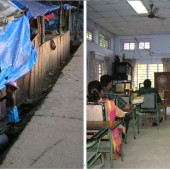Abstract: Throughout 2016 and 2017 more than 300 Indigenous nations from around the globe united on the plains of North Dakota, where Standing Rock affinity camps provided space for native prophecy and ceremony to play out in ways meaningful to our modern times. Standing Rock protection actions made clear to all what we’ve known for centuries: Indigenous peoples’ relationship to the natural world provides a powerful antidote to the prevailing madness that insists nature and people are expendable as long as money is being made. Within our own Rotinonhsyón:ni (Iroquois) nations the act of gratitude is at the heart of our key ceremony that connects us to our Earth as it dissipates this violent culture.
Continue ReadingAbstract: Decolonization is a multifaceted and complex process, involving a wide range of concepts, including the restoration of Indigenous lands to Indigenous control, improved recognition of tribal sovereignty, strengthening of Indigenous worldviews and knowledge traditions, cultivating cultural responsiveness in education and health care, aligning research methods with Indigenous cultural priorities and values, and more.
This special issue of the Journal of Sustainability Education on the topic of Decolonization and Sustainability Education reflects many of these diverse projects. The issue is inclusive of Indigenous and allied voices, of academic and Indigenous discourses, of large-scale political actions and—what Jeff Corntassel calls—“everyday acts of resurgence.” The selections are arranged in ways that center Indigenous voices and the work on the ground that reinforces Indigenous sustainabilities and Indigenous-centered pedagogies.
Continue Reading
Among all the pressing needs for educational innovations that we face today, arguably the most imperative is the need to elicit learners’ active collaboration towards a ‘Great Transition’ into a secure and sustainable future for humanity. Among the numerous challenges that this endeavour entails, the anticipated arrival of unprecedented numbers of climate refugees will severely challenge the capacities of host institutions to maintain human security – connecting to a second pressing need, namely to promote and maintain cultural safety for newcomers and hosts. We focus on the question how compatible those two educational projects might be. To what extent could a Transition curriculum include and inform a curriculum for cultural safety, and how could a curriculum devoted to the principles of decolonisation internalise the need for living within our means? Neither one can be successful without the other. In general the two educational projects are reconcilable and inform and reinforce each other. However, some specific objectives of the Transition curriculum, mainly in the affective domain, require careful attention to cultural differences and reasoned compromise.
Continue Reading
This paper provides a descriptive analysis of the experience of four doctoral students engaged in a collective project of place exploration at a midsize Canadian university. Under the methodological tradition of self-study, we contextualize concepts of place attachment and decolonization in order to investigate what it means to be interdisciplinary scholars of sustainability. We use storytelling and mobile discussion methods, alongside visual and mapping methods to disentangle our experiences and analyses of place, mobility, land, and scholarship. This reflective piece demonstrates that collaborative forms of scholarship such as this require deliberate moves toward community creation and place attachment within institutions of higher education. Through a process of collaborative investigation and writing, we have created spaces of caring academic scholarship rather than engaging in competitive and hierarchical university culture.
Continue Reading